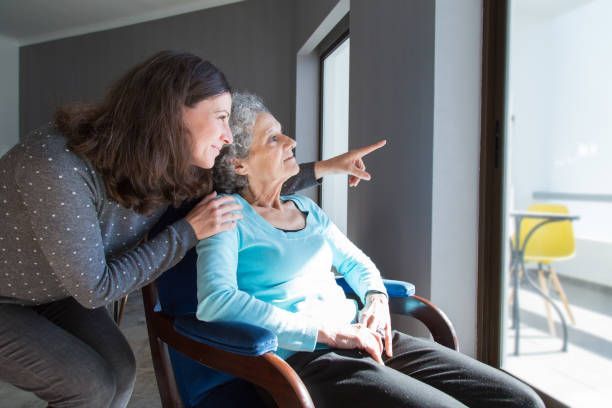
Providing the Same Level
of Care We Expect for
Our Own Family
(516) 408-0034
20 Signs of Cognitive Impairment and the Need for Home Care

20 Signs of Cognitive Impairment and How 7 Day Home Care Can Help
Cognitive impairment can manifest in various ways, impacting an individual's daily functioning and quality of life. Recognizing these signs is crucial for early intervention and appropriate care. At 7 Day Home Care, we specialize in dementia care, offering support and assistance to individuals and families across Manhattan, Queens, Nassau County, Brooklyn, and Suffolk County, New York. Our highly trained and experienced home health aides, under the supervision of registered nursing staff, are adept at addressing the challenges associated with cognitive decline. Here are 20 signs of cognitive impairment and how our home care services can make a meaningful difference in ensuring safety and well-being:
- Memory loss: Memory loss is a common and often concerning symptom of cognitive impairment, particularly in the early stages. Individuals may experience difficulty recalling recent events, conversations, or important information. This forgetfulness can disrupt daily routines, lead to frustration and confusion, and impact overall quality of life. Forgetting names, appointments, or where items are placed may become more frequent and noticeable over time. Memory loss can affect various aspects of daily living, from remembering to take medications to recalling familiar routes. As cognitive impairment progresses, memory loss may worsen, making it increasingly challenging for individuals to retain and recall new information or even recognize familiar faces. Strategies such as memory aids, routine reinforcement, and cognitive exercises may help manage memory loss and improve functioning, but early recognition and intervention are crucial for effective support.
- Difficulty speaking: Difficulty speaking, also known as aphasia, is another common sign of cognitive impairment, particularly in conditions such as Alzheimer's disease or vascular dementia. Individuals may struggle to find the right words, articulate thoughts coherently, or understand language. This difficulty can lead to frustration, social isolation, and communication breakdowns, impacting relationships and daily interactions. Speech therapy and communication techniques can help individuals improve their ability to express themselves and understand others, but ongoing support and patience from caregivers are essential for managing this symptom.
- Forgetfulness of recent events: Forgetfulness of recent events is a hallmark symptom of cognitive impairment, affecting short-term memory and leading to difficulties in recalling recent experiences, conversations, or activities. Individuals may repeatedly ask the same questions or forget important details shortly after learning them. This forgetfulness can be distressing and disruptive, impacting daily functioning and causing individuals to feel disconnected from their surroundings. Caregivers can provide support by using memory aids, creating structured routines, and offering reassurance and reminders to help individuals cope with this symptom.
- Losing the ability to organize tasks: Losing the ability to organize tasks is a common challenge for individuals with cognitive impairment, as it affects executive functioning skills such as planning, prioritizing, and problem-solving. Individuals may struggle to initiate or complete tasks, maintain focus, or follow through with plans. This difficulty can lead to feelings of overwhelm, frustration, and a loss of independence. Caregivers can offer practical support by breaking tasks into manageable steps, providing visual cues or checklists, and offering encouragement and guidance to help individuals stay organized and maintain a sense of control over their daily lives.
- Personality changes: Personality changes, such as shifts in mood, behavior, or temperament, can be early indicators of cognitive impairment. Individuals may become more irritable, anxious, or withdrawn, or exhibit changes in personality traits such as impulsivity or disinhibition. These changes can be distressing for both the individual and their loved ones, impacting relationships and social interactions. Understanding and empathizing with these changes, along with providing emotional support and reassurance, are essential for helping individuals navigate this challenging symptom. Additionally, engaging in activities that promote relaxation, socialization, and emotional well-being can help mitigate the impact of personality changes and improve overall quality of life.
- Difficulty completing familiar tasks: Difficulty completing familiar tasks is a common symptom of cognitive impairment, affecting individuals' ability to perform routine activities of daily living independently. Tasks such as cooking, grooming, or managing finances may become increasingly challenging as cognitive abilities decline. Individuals may struggle with sequencing steps, following instructions, or remembering how to perform tasks they once did effortlessly. This difficulty can lead to frustration, feelings of incompetence, and a loss of confidence in one's abilities. Caregivers can provide support by breaking tasks into simpler steps, providing prompts or reminders, and offering encouragement and praise for even small accomplishments. Creating a supportive and empowering environment that fosters independence while also offering assistance as needed is key to helping individuals maintain their sense of dignity and autonomy.
- Apathy and withdrawal or depression: Apathy, withdrawal, or depression are common psychological symptoms of cognitive impairment, often stemming from the frustration, loss, and isolation associated with declining cognitive abilities. Individuals may lose interest in activities they once enjoyed, withdraw from social interactions, or experience feelings of hopelessness and sadness. These symptoms can significantly impact quality of life, exacerbate cognitive decline, and increase the risk of other health issues such as anxiety and sleep disturbances. Caregivers can provide emotional support, companionship, and encouragement to help individuals engage in meaningful activities, maintain social connections, and address underlying mental health concerns. Creating a supportive and stimulating environment that promotes emotional well-being and a sense of purpose is essential for managing these symptoms and improving overall quality of life.
- Attention challenges: Attention challenges, such as difficulty maintaining focus, sustaining concentration, or ignoring distractions, are common cognitive symptoms that can impact various aspects of daily functioning. Individuals may struggle to follow conversations, complete tasks, or stay engaged in activities for extended periods. This difficulty can lead to feelings of frustration, inefficiency, and reduced productivity. Caregivers can help individuals improve their attention and concentration through techniques such as environmental modifications, time management strategies, and mindfulness exercises. Providing a structured and supportive environment that minimizes distractions and promotes focus can help individuals better manage attention challenges and improve their overall cognitive functioning.
- Challenges in planning or solving problems: Challenges in planning or solving problems are common cognitive symptoms of impairment, affecting individuals' ability to anticipate consequences, make decisions, and develop strategies to achieve goals. Individuals may struggle with tasks that require abstract thinking, critical reasoning, or flexible problem-solving skills. This difficulty can lead to inefficiency, indecision, and feelings of inadequacy. Caregivers can provide support by breaking tasks into manageable steps, offering guidance and encouragement, and helping individuals develop adaptive problem-solving strategies. Providing opportunities for practice, feedback, and reinforcement can help individuals improve their planning and problem-solving abilities and regain a sense of competence and independence.
- Poor judgment: Poor judgment, characterized by impulsive or risky decision-making, is a common cognitive symptom of impairment that can have significant consequences for individuals' safety and well-being. Individuals may make decisions that put themselves or others at risk, such as overspending, neglecting personal hygiene, or engaging in unsafe behaviors. This difficulty can lead to accidents, financial problems, or legal issues, further exacerbating the challenges associated with cognitive decline. Caregivers can provide supervision, guidance, and support to help individuals make safer and more informed decisions. Establishing clear boundaries, offering alternatives, and reinforcing positive behaviors are essential strategies for managing poor judgment and promoting individuals' overall safety and independence.
- A short temper and aggression: A short temper and aggression are common behavioral symptoms of cognitive impairment, often stemming from frustration, confusion, or difficulty expressing needs and emotions. Individuals may become easily irritable, argumentative, or hostile in response to perceived threats or stressors. These behaviors can be distressing for both the individual and their caregivers, impacting relationships and overall quality of life. Understanding the underlying causes of aggression, such as pain, discomfort, or unmet needs, is essential for effectively managing these behaviors. Caregivers can provide emotional support, de-escalation techniques, and alternative coping strategies to help individuals manage anger and aggression in a safe and constructive manner. Creating a calm and structured environment that minimizes triggers and promotes relaxation can also help reduce the frequency and severity of these behaviors over time.
- Anxiety: Anxiety is a common psychological symptom of cognitive impairment, often stemming from uncertainty, confusion, or fear of the unknown. Individuals may experience excessive worry, restlessness, or physical symptoms such as rapid heartbeat or sweating. This anxiety can significantly impact daily functioning, exacerbate cognitive symptoms, and interfere with social interactions and activities. Caregivers can provide reassurance, emotional support, and relaxation techniques to help individuals manage anxiety and cope with stressors. Creating a predictable and comforting environment, maintaining routines, and offering distraction and diversion techniques can also help alleviate anxiety symptoms and improve overall quality of life.
- Confusion: Confusion is a hallmark symptom of cognitive impairment, affecting individuals' ability to process information, make sense of their surroundings, and respond appropriately to stimuli. Individuals may become disoriented to time, place, or person, leading to feelings of insecurity, agitation, or distress. This confusion can be triggered by changes in routine, unfamiliar environments, or overwhelming sensory stimuli. Caregivers can provide reassurance, redirection, and gentle reminders to help individuals regain their bearings and manage confusion effectively. Creating a structured and predictable environment, using familiar cues and routines, and offering simple explanations can also help minimize confusion and promote a sense of safety and security.
- Confusion with time or place: Confusion with time or place is a common cognitive symptom of impairment, affecting individuals' sense of temporal and spatial orientation. Individuals may become disoriented to the current time, date, or season, or struggle to recognize familiar landmarks or locations. This confusion can lead to feelings of anxiety, agitation, or vulnerability, particularly when navigating unfamiliar environments or situations. Caregivers can provide support by using visual cues, calendars, and clocks to help individuals maintain a sense of time and place. Establishing consistent routines, providing clear directions, and offering reassurance and guidance can also help individuals feel more grounded and confident in their surroundings.
- Difficulty finding the right words: Difficulty finding the right words, also known as word-finding difficulty or anomia, is a common cognitive symptom of impairment that affects language processing and communication. Individuals may struggle to recall specific words or phrases, leading to pauses, hesitations, or substitutions in speech. This difficulty can be frustrating and embarrassing, causing individuals to withdraw from conversations or avoid social interactions. Caregivers can provide support by offering alternative ways to communicate, such as using gestures, pictures, or written cues. Encouraging patience and active listening, as well as creating a supportive and non-judgmental environment, can also help individuals feel more confident and expressive in their communication.
- Inability to communicate: Inability to communicate effectively is a profound and distressing symptom of cognitive impairment, affecting individuals' ability to express thoughts, needs, and emotions. Individuals may experience difficulty speaking, understanding language, or using non-verbal communication methods. This inability to communicate can lead to feelings of frustration, isolation, and dependency, impacting overall quality of life and well-being. Caregivers can provide support by using alternative communication methods, such as gestures, facial expressions, or communication boards, to help individuals express themselves. Creating opportunities for social interaction, active listening, and validation of emotions can also help individuals feel heard and understood, enhancing their sense of dignity and autonomy.
- Increased sleeping: Increased sleeping, also known as hypersomnia, is a common symptom of cognitive impairment that can stem from changes in brain function, medication side effects, or disruptions in sleep-wake cycles. Individuals may spend more time sleeping during the day or experience difficulty staying awake and alert during waking hours. This excessive sleeping can impact daily functioning, reduce engagement in activities, and exacerbate feelings of fatigue and lethargy. Caregivers can help individuals maintain a regular sleep schedule, promote healthy sleep habits, and address underlying medical or environmental factors contributing to hypersomnia. Creating a comfortable and calming sleep environment, establishing bedtime routines, and encouraging daytime activity and exposure to natural light can also help regulate sleep-wake cycles and improve overall sleep quality.
- Losing things often: Losing things often, or misplacing items frequently, is a common cognitive symptom of impairment that can stem from memory problems, attention difficulties, or organizational challenges. Individuals may struggle to remember where they placed commonly used items such as keys, glasses, or wallets, leading to frustration, inconvenience, and increased reliance on others for assistance. This difficulty can impact daily functioning, disrupt routines, and erode individuals' sense of independence and self-efficacy. Caregivers can provide support by implementing organization strategies, such as designated storage areas or labeling systems, to help individuals keep track of their belongings. Offering reminders and assistance with locating lost items, as well as providing emotional support and reassurance, can also help individuals cope with this challenging symptom.
- Problems concentrating: Problems concentrating, or difficulty maintaining focus and attention, are common cognitive symptoms of impairment that can impact various aspects of daily functioning. Individuals may struggle to stay engaged in tasks, follow conversations, or complete activities without becoming distracted or overwhelmed. This difficulty can lead to inefficiency, forgetfulness, and reduced productivity, exacerbating feelings of frustration and inadequacy. Caregivers can help individuals improve their concentration and focus through techniques such as environmental modifications, mindfulness exercises, and task segmentation. Providing a quiet and organized workspace, minimizing distractions, and offering regular breaks can also help individuals better manage concentration difficulties and improve their overall cognitive functioning.
- Reasoning and judgment: Reasoning and judgment difficulties, characterized by impaired decision-making and problem-solving abilities, are common cognitive symptoms of impairment that can have significant consequences for individuals' safety and well-being. Individuals may struggle to anticipate consequences, weigh risks and benefits, or consider alternative courses of action when making decisions. This difficulty can lead to poor choices, accidents, or financial problems, further exacerbating the challenges associated with cognitive decline. Caregivers can provide support by offering guidance, feedback, and supervision to help individuals make safer and more informed decisions. Establishing clear boundaries, offering alternatives, and reinforcing positive behaviors are essential strategies for managing reasoning and judgment difficulties and promoting individuals' overall safety and independence.
It's important to recognize that the presence of any of the aforementioned signs of cognitive impairment does not necessarily indicate a definitive diagnosis of a particular condition. While these signs may point to cognitive decline, they can also be attributed to various other factors, including stress, fatigue, medication side effects, or other medical conditions. Therefore, seeking guidance from medical professionals, such as primary care physicians, neurologists, or geriatric specialists, is crucial for accurate assessment and diagnosis. Medical professionals can conduct thorough evaluations, including cognitive assessments and diagnostic tests, to determine the underlying cause of cognitive symptoms and develop appropriate treatment plans. Early detection and intervention are key to managing cognitive impairment effectively and improving overall outcomes. If you or a loved one are experiencing any of these signs, don't hesitate to reach out to a healthcare provider for guidance and support.
Recognizing the signs of cognitive impairment is essential for providing appropriate care and support to individuals experiencing cognitive decline. At 7 Day Home Care, our specialized dementia care services are tailored to meet the unique needs of each individual, offering compassionate support, personalized assistance, and a safe environment to enhance overall well-being and quality of life. Please call 516-408-0034 or visit 7 Day Home Care to learn more about our exceptional and affordable home care services in Manhattan, Queens, Brooklyn, Nassau County, and Suffolk County, New york.
Brian Callahan
7 Day Home Care










Hours of Operation
We are Open 24 Hours a Day
7 Days a Week
All Rights Reserved | 7 Day Home Care | Created by DAR Web Consulting